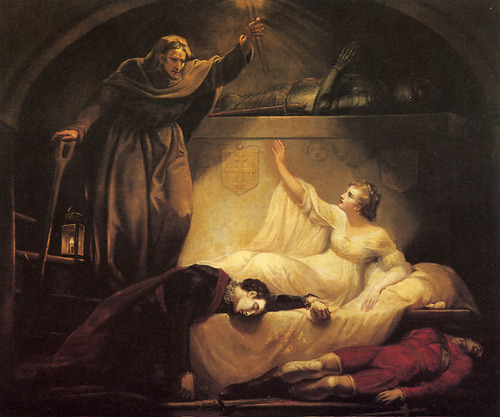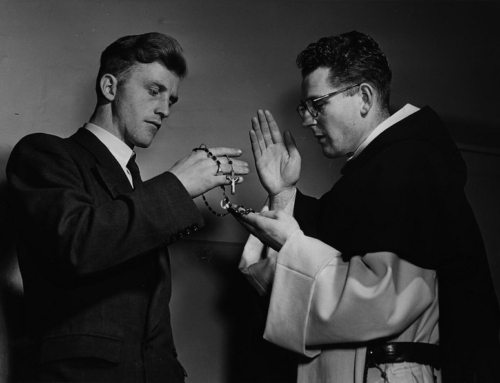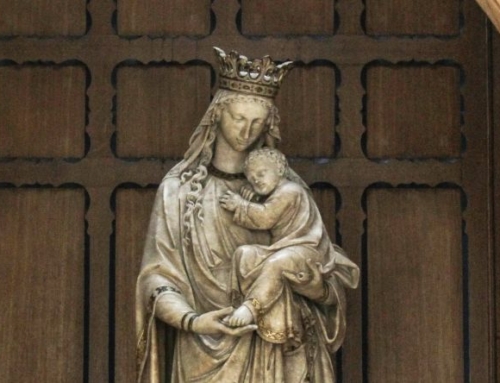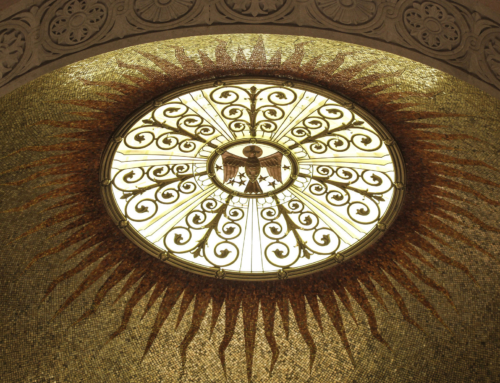Discover a book and uncover its author’s faith? That is what some would like to suggest in the case of Shakespeare. Last November, a previously unknown copy of the First Folio—the first collected edition of Shakespeare’s plays, and arguably the literary world’s most valuable printed book—surfaced at a public library in Saint-Omer, a small town outside of Calais, France. Many news outlets emphasized the provenance of this copy of the First Folio, implying that new insights into Shakespeare’s personal faith could be gleaned from the pages of this book’s history.1 According to the acquisition records, this First Folio belonged to a Jesuit-run college in Saint-Omer. The college had been founded in 1593 to educate recusant Catholics escaped from England, laymen and seminarians alike. When the institution was closed in the mid-eighteenth century, its book collection was donated to establish a town library. Ever since, this copy of the First Folio had remained well-preserved but improperly catalogued; its missing title-page and front matter meant librarians mistook it as a later edition of Shakespeare’s dramatic works.
Had a new way to strengthen ties between Shakespeare and Roman Catholicism been made? The New York Times dedicated meaningful space to the question. The Washington Post organized their coverage around this very issue. The Independent went so far as to run the headline “Discovery of ‘lost’ Shakespeare First Folio revives claim playwright was a secret Catholic.”
This revival has already been going strong for some time, however. In fact, more attention has been paid to the question over the last fifteen years than ever before. A series of factors—some scholarly, some cultural—have fueled this reconsideration. Precisely because there is no decisive biographical evidence for Shakespeare’s personal belief, any and every detail about his life, his family, and his works has undergone intense scrutiny. And, as the case of the Saint-Omer First Folio reveals, association can easily be crafted into causation. Without a doubt, the discovery of this Folio is significant for what it can tell us about Shakespeare’s status in early modern Catholic culture and the ways in which Catholics read and received his work. It tells us about Roman Catholics and Shakespeare, but by no means concedes to us a Roman Catholic Shakespeare.
While the discovery resolves nothing about what Shakespeare believed, it does reveal something of what and how we believe. I am less concerned here with whether Shakespeare was Catholic—a question that I think is beyond our ability to infer from the available evidence—than I am interested in the topics of why the question of his faith matters so much to us and when exactly it began to matter. Examining these questions, we find cases of faith seeking not understanding but rather validation, authentication, and other aims. By turning a critical eye to the history of the claims about his religion, considering both the underlying assumptions and overt aims of those who have argued Shakespeare was a secret Papist, or a fastidious Protestant, or a god in his own right, we can better appreciate the Bard-baggage that has been handed down to us. We can be more attentive to what religious sensitivities are, and are not, to be found in his works—and in us.
Reading Religion into Shakespeare’s Life
At least two things are certain: William Shakespeare was baptized a Protestant and he received a Protestant burial. His mortal remains lie beneath the sanctuary floor of Holy Trinity Anglican Church in Stratford-upon-Avon, the hometown to which he returned after retiring from his profitable career as a professional actor and dramatist in London. Because he lived in an age of religious upheaval, however, a time of conversion and reversion, of disunity between interior belief and exterior conformity (non-conformity being a form of treason, severely punished—producing what historian Christopher Marsh has classified as the “compliance conundrum”2), it is difficult to say anything else definitive about Shakespeare’s religious identity. The same applies for the vast majority of early modern English peoples. At every turn, with every biographical detail and literary allusion, there are enticing hints and suggestions about Shakespeare’s faith, but little solid ground to be gained.
To cite only a few examples, in order to provide a sense for the dizzying back-and-forth one finds when reading any number of studies on the subject: yes, Shakespeare was baptized by a Protestant minister, since Henry VIII’s daughter Elizabeth had taken the throne five years before Shakespeare’s birth and outlawed all Catholic practices. But Shakespeare’s elder sister, Joan, had been baptized in the Roman rite, when Queen Mary reigned. With which confession did his parents, John and Mary, align themselves more closely? We know not. Each parent had a Catholic background, yet for his part, in his role as a town administrator, John Shakespeare was willing to oversee the whitewashing of Stratford’s Guild Chapel in the 1560s, along with the destruction of the high altar and removal of the rood screen. Some thirty years later, the same John Shakespeare was cited for recusancy, having failed to attend Sunday services. This violation would seem to provide evidence for his Catholicism—except for the fact that the document does not include his name with a list of “dangerous and seditious” papists. Instead, it indicates that he did not attend services for fear of being processed for payment of a debt. In the mid-eighteenth century a “Spiritual Testament,” or a Roman Catholic profession of faith, was discovered by workers at the Shakespeare Birthplace, with John’s name affixed. But the document has gone missing. The eighteenth century’s premier Shakespeare scholar, Edmund Malone, studied the document and published a transcription to much fanfare, but then later decried it as a forgery. After all this, we still have not even gotten to William Shakespeare’s education, conducted by a string of schoolmasters with family ties to English Jesuits, or to his “lost years,” where he just might have taught in a recusant household in Lancashire. This is to say nothing of his plays and poetry, which allude to various aspects of Catholic life and reveal familiarity with the 1582 Douay-Rheims Bible—but which also rely heavily on the Geneva Bible. In other words, there is no shortage of material about which to make conjectures, and plenty have been made. Yet conjectures only do they remain.
Such suppositions about Shakespeare’s Catholicism, or at least his antipathy toward state-sanctioned Anglicanism, began early—even during his lifetime. Biographers tell us that there were two seventeenth-century proponents of a Catholic Shakespeare, but when one looks more closely, neither is quite so credible. One, a staunch Protestant historian named John Speed, made a passing comment in a work from 1611 (five years before Shakespeare’s death) about his disdain for papists and stage poets, and how the works of the latter provide fodder for the former. Speed has a Shakespeare play in mind here, the history play Henry IV, Part One, and its comical depiction of the proto-Protestant martyr Sir John Oldcastle (Falstaff), whom the Jesuit Robert Parsons had more recently lambasted. While there is much more to be said about Shakespeare’s depiction of discernibly Protestant, as well as Catholic, figures in his works, nevertheless, the extent to which Speed’s jeer implicates Shakespeare as a Catholic is questionable. The second case involves the notes compiled by an antiquarian, William Fulman, of Corpus Christi College, Oxford. Upon his death in 1688, his papers fell into the hands of his friend, the Anglican cleric Richard Davies, who ultimately published a small passage of anecdotal writings about Shakespeare. The entry concludes with a phrase that has taunted many over the centuries: “he dyed a Papist.” Nothing about the source or credibility of this testimony is known (indeed, some other details Davies includes about Shakespeare’s life are true, an equal amount false). Such questions and suggestions about Shakespeare and Catholicism would lie dormant for centuries, not to resurface in any meaningful way until well after Shakespeare became his own religion.
The Eras of Protestant Appropriation & Bardology
The Shakespeare venerated today—cultural icon, timeless literary genius—was not always so highly exalted. Every would-be saint needs others to advance his cause. So while Shakespeare’s works were popular in his lifetime, it may be surprising to learn that he fell into comparative disregard in the opinions of the Civil War and Restoration generations. The cult of the Bard as we know it did not begin to materialize until some hundred years after his death.
By the mid-eighteenth century, Shakespeare’s person and plays were being repurposed because they better suited the tastes of the times. This was a period marked by the rise of pre-empire British nationalism. Shakespeare, as well as John Milton, was used to combat the influence of French classicism, and both were held up as icons of British literary and cultural supremacy. Shakespeare’s firm status as a Protestant was presumed. As Robert S. Miola summarizes it well, “[t]he cultural and political forces that crowned Shakespeare as the English national poet naturally portrayed him as the product and loyal member of the Church of England.”3
The more Shakespeare became his own god, the less his religion mattered at all. In fact, in the nineteenth century many sought to cast the notion of his personal religious belief as an impediment to his genius. The thought of Shakespeare investing himself in matters of confessional conflict offended Victorian sensibilities. As the critic Thomas Carlyle wrote, “Shakespeare was no sectarian; to all he deals with equity and mercy; because he knows all, and his heart is wide enough for all.”4 Elsewhere he ordains Shakespeare the “melodious Priest of a true Catholicism, the ‘Universal Church’ of the Future and of all times.”5 The religious sense in Shakespeare can be neither allied nor harmonized with his genius; it is only an appreciation among Bardolators of the religious quality of Shakespeare that matters. After this period of Shakespeare-worship, Shakespeare as well as the concept of religious worship underwent their severest trials. But somehow, interest in Shakespeare’s religion survived Nietzsche’s proclamation of the death of God and the corresponding “death of the author” pronounced by the deconstructionist theorists Derrida and Barthes. In fact, that interest became stronger than ever.
Contemporary Claims on the Bard
The 1992 publication of Eamon Duffy’s The Stripping of the Altars inaugurated what has become a vibrant reassessment of the role of Catholicism in early modern Protestant England, as this work offered a necessary corrective to the dominant Whig view of history being rehearsed in the humanities. The work of historians like Duffy, Jack Scarisbrick, Christopher Haigh, Peter Lake, and Alexandra Walsham has, as Miola puts it,
begun to dismantle the Whig vision of blessed Protestant Britannia, cleansed of popish corruption, rising in the godly Reformation morning. Instead they portray a conflicted United Kingdom, wherein factions fought, compromised, and responded to political pressures. Their England includes Catholics as part of a divided, struggling population, not as a lunatic fringe or treasonous minority. It also includes Catholicism, not as a dying institution, but as a vital, dynamic, pluralistic, and learned confession that could inspire both heroism and holiness.6
Where historians have gone, literary critics have followed. As a result, professional Shakespeare studies is experiencing a bona fide religious revival. The field’s foremost critics are dedicating entire monographs to the subject, and acknowledging as the starting premise for their work that, in the words of Yale Shakespearean David Scott Kastan, “[s]piritual, affective, and material remains of the traditional religion mark both Shakespeare and his England, not as some sticky residue that cannot quite be removed but as something constitutive of the makeup of each.”7 In other words, Catholicism is not problematic but productive for criticism. It can and does enhance our understanding of Shakespeare’s works and the worlds he creates in his drama, as studies by Arthur Marotti, Phebe Jensen, Alison Shell, and David Beauregard have shown.
This critical reappraisal of the role of religion generally, and Catholicism in particular, has encouraged some to pose the question that follows naturally enough: “Well, was Shakespeare a Catholic after all?” The most recent attempts to give a decisive, affirmative response leave one wishing they had not bothered to ask, however. One problem arises from the manner in which such arguments are constructed: some authors point to the lack of explicit evidence as proof that Shakespeare was a recusant, while others claim the exact opposite—that the proof is actually strewn all over his works, and that it only needs special decoding, as Clare Asquith contends in Shadowplay: The Hidden Beliefs and Coded Politics of William Shakespeare (2005). Already one starts to lose faith when confronted with such contradictions (Womersley, 63). Then there is the sense of triumphalism that motivates some of these studies, as seen in Joseph Pearce’s The Quest for Shakespeare. As H. W. Crocker III’s Triumph: The Power and the Glory of the Catholic Church (2001) is to Church history, so Pearce’s work is to the matter of Shakespeare’s religion. Other, more sensitive critics rightly leave things within the realm of possibility when examining the details of Shakespeare’s biography (he might have known the Jesuit martyr St. Robert Southwell, for example), whereas Pearce proceeds with a sense of unabashed certainty (arguing that the connection between Shakespeare and the Jesuit martyr is “solid”8). I admire Pearce’s zeal, less so his treatment of the historical record.
What Motivates the Quest for a Catholic Shakespeare?
From the eighteenth century on, Shakespeare has been claimed in some form by each generation. The preceding sections have sought to chart this historical development and to provide the motivation for a more sensitive self-appraisal when it comes to one’s readiness to discover Shakespeare to be a Catholic. Two final questions remain: why the papist push, and why now? For even a 2011 opinion piece in the Vatican’s L’Osservatore Romano declared that there is “little doubt” that Shakespeare was Catholic.9 The critical reappraisal described above has helped inspire this movement, but other motivations seem to be at work. It is possible that we are turning to earlier periods because we lack a major Catholic presence in the contemporary literary world. We cling to the likes of Flannery O’Connor and J. R. R. Tolkien, and their work merits continued attention, but we are also looking for a new voice, a fresh perspective. Lacking that, we turn to the past. And Shakespeare’s name keeps surfacing in association with early modern Catholic culture, which makes us all the more willing to seize upon him.
The experience of early modern recusant Catholics may also be inherently attractive. Today’s Catholics who are intentional in living out their faith have, in some sense, been radicalized by a secular culture increasingly hostile to expressions of Christian faith and ethics. In Shakespeare’s England we are able to find a parallel historical construct, one which also demanded a radical response to the gospel message. In search of validation, we wish to claim Shakespeare in the process. But if it is heroic Catholics we seek, the early modern period offers us unambiguous saints like Edmund Campion and Southwell, not Shakespeare. Where practicing Bardology would fail to bring us more fully into the presence of the true God, a meditative reading of Southwell’s poem “The Burning Babe,” which details in moving fashion a mystical vision of the Christ Child, could succeed.
Our fascination with Shakespeare’s religion also reveals our indebtedness to particular ideas about the relationship between the literary artist and his art, ideas that have only emerged centuries after Shakespeare’s time. For we live in an era shaped by the notion of the autobiographical self, popularized by works like Walt Whitman’s flamboyantly self-expressive “Song of Myself” and by theoretical movements like Freudian psychoanalysis. (Our indebtedness to such trends, particularly Romanticism, has helped efforts to resist the late-modern denial of the author and the perceptibility of authorial intent, referenced above.) While we are quite comfortable reading out from a literary work to make judgments about the psychological state of its author,10 we are less trained in thinking critically about the assumptions with which we read ourselves into the same literature. As much as the former may be available to us, we should be just as cognizant of the latter. Certainly Dante’s and Milton’s religious affiliations are clear from their poetry; each made the explicit choice to utilize his faith to shape his art. Theirs is a kind of “theopoetics.” We should recall, however, that the stakes were different for Shakespeare. He was not only a dramatist but also a principal shareholder in the theater company for which he wrote. The more popular his plays, the greater his and the company’s profit. Catering to an ever-expanding and confessionally-diverse metropolitan population, it is not surprising that his plays are so hard to pin down in terms of their theological or spiritual essence. It seems that, like St. Paul, Shakespeare sought to be all things to all men (1 Cor 9:19). Unlike St. Paul, he did so not to save some, but rather to edify all. And to make his living in so doing. The existence of works like Joseph Pearce’s, as well as James Howe’s A Buddist’s Shakespeare (1994), Eric S. Mallin’s Godless Shakespeare (2007), and Shakesqueer: A Queer Companion to the Complete Works of Shakespeare (2011), edited by Madhavi Menon, are perhaps an unavoidable result of the uniquely universal appeal of Shakespeare’s works. Everyone can find what he or she wants in Shakespeare.
Whether it was his intention or not, Shakespeare’s elusiveness—the distinct sense that there is something for everyone in his art—continues to draw readers and audiences to him. That broad appeal is why seventeenth-century recusants driven from their homeland made the effort to bring a copy of the First Folio along with them. Shakespeare’s art was able to enhance their lives in some capacity, to teach and delight them, as it does the same for us. Is that because Shakespeare was a Catholic writer? We cannot say for certain. But Shakespeare was undoubtedly a religious writer, as scholar Stanley Wells asserts. He is one “who is aware, and makes his spectators aware, of the mystery of things.”11 This fact remains sure, whether or not he prayed the mysterium fidei at secret Catholic Masses held in Stratford or London.
To download a printable PDF of this Article from
Dominicana Journal, Summer 2015, Vol LVIII, No. 1, CLICK HERE.
Endnotes
1 Unless otherwise specified, I take “faith” to mean personal religious belief, the kind by which one affiliates oneself with a particular religious denomination—namely the Church of England or Roman Catholicism, for the purposes of this essay. To consider Shakespeare’s faith, then, means to assess whether he personally identified as a Catholic or a Protestant. I stress “personally” here because, as will be demonstrated, it was not uncommon for early modern English men and women to publicly comply with the state-organized religion yet privately remain loyal to the dissident creed. Meanwhile, when referring to matters of “our” faith, the collective subject I have in mind includes two groups. The first is comprised of Catholics, especially those who, for any variety of reasons, would like very much to claim Shakespeare as a fellow believer. But I also hope this essay appeals to a second, broader group, including those who identify themselves more generically as Christians, share some Christian sympathies, and/or for whom Shakespeare’s faith matters in a personal way. The dynamic animating this study involves people of faith reading faith into Shakespeare, out of their own vested religious interests.
2 Christopher Marsh, Popular Religion in Sixteenth-Century England (Basingstoke: Macmillan Press, 1998), 197.
3 Robert S. Miola, “Shakespeare’s Religion,” First Things (May 2008), http://www.firstthings.com/article/2008/05/002-shakespeares-religion.
4 Thomas Carlyle, Critical and Miscellaneous Essays (London: Chapman and Hall), vol. 1, 619; cited in David Womersley, “Why the World Still Loves Shakespeare,” Standpoint, 69 (January/February 2015), 63.
5 Thomas Carlyle, On Heroes, Hero-Worship and the Heroic in History (London: Chapman and Hall, 1840), 130.
6 Robert S. Miola, Early Modern Catholicism: An Anthology of Primary Sources (Oxford: Oxford University Press, 2007), 8. See also Ethan H. Shagan, ed., Catholics and the ‘Protestant Nation’: Religious Politics and Identity in Early Modern England (Manchester: Manchester University Press, 2005).
7 David Scott Kastan, A Will to Believe: Shakespeare and Religion (Oxford: Oxford University Press, 2014), 49.
8 Pearce, The Quest for Shakespeare: The Bard of Avon and the Church of Rome (San Francisco: Ignatius Press, 2008), 112. Pearce also overlooks important details. For example, he seems unaware that the Shakespeare scholar Edmund Malone issued a retraction concerning the Spiritual Testament of John Shakespeare. Malone came to see it as a forgery, and many critics since have likewise doubted its authenticity. See Kastan, 22–26; and Robert S. Miola, “Thy Canonized Bones,” First Things (August 2008), http://www.firstthings.com/article/2008/08/001-thy-canonized-bones.
9 L’Osservatore Romano, Nov. 18, 2011.
10 As part of his study of the debate over the authorship of Shakespeare’s works, James Shapiro calls attention to the impact of this development in the history of reader reception. See Contested Will: Who Wrote Shakespeare? (New York: Simon & Schuster, 2010), 10, 112–14.
11 Stanley Wells, Shakespeare: For All Time (Oxford: Oxford University Press, 2003), 173.




